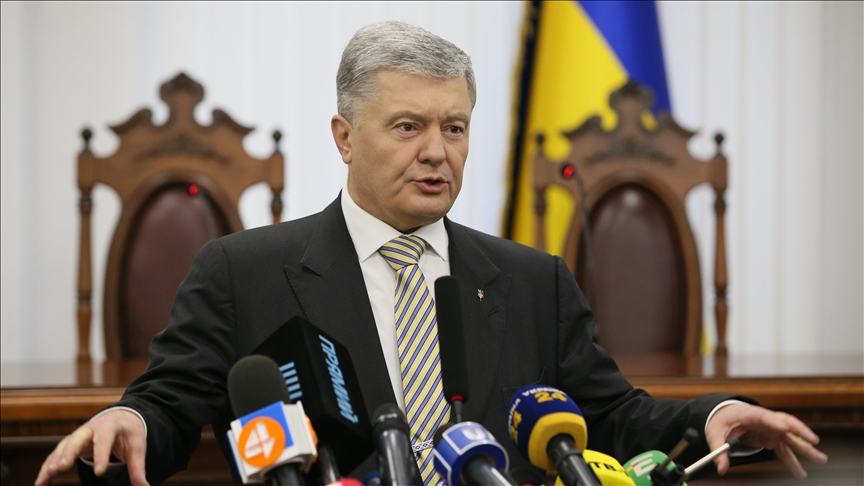Ex-Ukrainian president calls on eastern Europe to fall into line over EU's Ukrainian grain ruling
As Poland's nationalist government ramps up its pro-famer rhetoric ahead of poll later this year, Brussels fears Ukrainian grain exports issue will undermine solidarity with Kyiv
 FILE PHOTO - Former Ukrainian President Petro Poroshenko. Baris Seckin - Anadolu Agency
FILE PHOTO - Former Ukrainian President Petro Poroshenko. Baris Seckin - Anadolu Agency
WARSAW
Former Ukrainian President Petro Poroshenko has called on the EU's eastern members to accept the European Commission’s decision after the EU executive admonished Poland, Hungary, Slovakia, Romania, and Bulgaria over bans on the transit of Ukrainian grain.
“Let’s not play any tricks with security. This is too dangerous,” Poroshenko told Anadolu after a panel discussion at the 15th European Economic Congress in Katowice, southern Poland.
“I propose that the position of the European Commission was absolutely clear. Let’s compensate some losses to Polish farmers, but not to limit the export of Ukrainian agri-products,” said Poroshenko, who served as president from 2014 to 2019 before losing the last election to Volodymyr Zelenskyy.
Ukraine's EU neighbors should be wary of undermining pro-Kyiv solidarity during the ongoing grain crisis, he said.
As Poland's nationalist government ramps up its pro-famer rhetoric ahead of the parliamentary elections later this year, Brussels fears that the issue of Ukrainian grain exports will undermine solidarity with Kyiv.
Five Central European countries – Poland, Hungary, Slovakia, Romania, and Bulgaria – introduced import bans from Ukraine on April 15. However, Poland and Romania later agreed to continue allowing grain from Ukraine to enter their countries.
The five EU members argued that their farmers have been hurt by excessive Ukrainian agricultural imports, which have lowered prices for local producers.
The European Commission is slated to continue talks on the issue this week with Ukraine’s neighboring countries.
While EU politicians have said the blockades are illegal. One EU diplomat accused Warsaw of "gesture politics."
The European Commission’s spokesperson for trade and agriculture said trade policy is an EU-exclusive competence, and that unilateral actions “are not acceptable.”
“In such challenging times, it is crucial to coordinate and align all decisions within the EU,” he added.
Ukraine relies on grain exports, which before the war fed 400 million people.
Warsaw has said national laws allow it to implement blockades for public safety reasons.
Ukraine’s Agriculture Minister Mykola Solsky said last week that Ukrainian agricultural products shipped to and through Poland represented 10% of the country’s total food exports and Hungary accounted for a further 6%.
With the summer harvest season approaching, the situation could get more complicated, while Poland and Slovakia have general elections later this year, where the rural vote will be crucial.
Only NATO
Only NATO membership will guarantee security for Ukraine, Poroshenko said during the panel discussion in Katowice. "The war will end when Ukraine joins NATO, which will guarantee its long-term security," declared the former president.
He added that it is also necessary to "deputinize" the entire continent, including Poland, Germany, France, and Russia itself.
Former Polish President Aleksander Kwasniewski, who accompanied Poroshenko, stressed that only NATO membership would provide Ukraine with fair security guarantees.
"A free, democratic world, a free Europe must win," he said, adding that Europe needs to speed up the supply of ammunition, armed combat vehicles, and combat equipment to Ukraine. He said that it would be difficult for Ukraine to win without accelerated and intensified supplies.
He added that the region’s history is full of examples of peace imposed from above. “And usually they mean not so much peace… (but) peace for the Western world. That's what Yalta and Potsdam were all about," he said.
Many Poles have long believed that the West was willing to sell Central Eastern European (CEE) countries to Russia in exchange for peace at Yalta and Potsdam at the end of WWII.
Anadolu Agency website contains only a portion of the news stories offered to subscribers in the AA News Broadcasting System (HAS), and in summarized form. Please contact us for subscription options.







